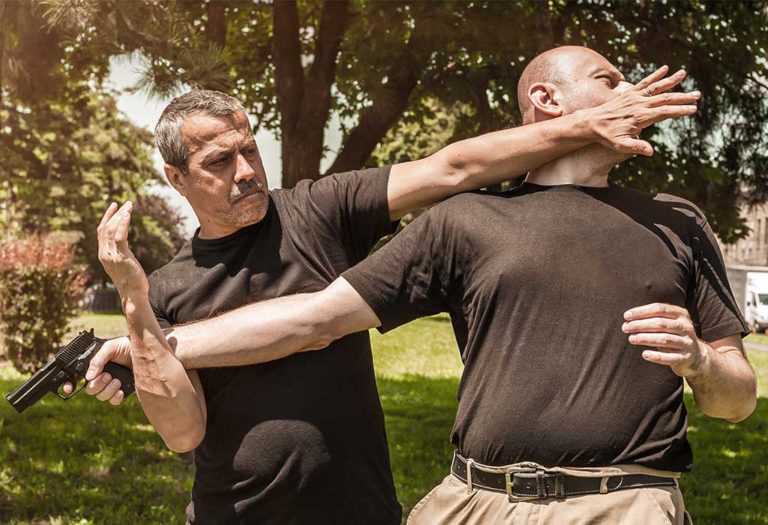LinkedIn E-Newsletter: My conversation with Master Kravist, Gus Bottazzi on the “Joseph Jaffe is not Famous” online talk show.
“You should be so good that you don’t hurt them.” – Gus Bottazzi
In an enlightening episode of “Joseph Jaffe is Not Famous,” Gus Bottazzi, a seasoned Krav Maga instructor, delves into the profound impact of this martial art on both personal empowerment and corporate culture. The conversation uncovered the depths of Krav Maga beyond mere self-defense, exploring its philosophical underpinnings and its relevance to everyday challenges and threats in modern corporate settings.
Here are 5 main themes we covered in our conversation:
Theme 1: Empowerment Through Awareness Krav Maga is not just about physical defense; it is equally about fostering a sense of empowerment through heightened awareness. Gus emphasizes the importance of being aware of one’s environment and interpreting social cues to anticipate potential threats. This awareness is not limited to recognizing danger but also involves understanding the dynamics of one’s surroundings, whether in a corporate setting or in public spaces. By developing situational awareness, individuals can take proactive steps towards their personal security, transforming fear into confidence.
Theme 2: Psychological Resilience The conversation highlighted the psychological components of Krav Maga, focusing on overcoming the natural ‘freeze’ response that many experience during high-stress situations. Gus discusses how Krav Maga training prepares individuals to handle stress and fear by instilling a mindset geared towards quick and decisive action. This training is invaluable not only in physical confrontations but also in navigating high-pressure business scenarios, where quick decision-making is crucial.
Theme 3: Tailored Training for All Gus advocates for the adaptability of Krav Maga to suit individuals of all physical capabilities and backgrounds. This personalized approach ensures that training is inclusive and relevant, addressing the specific needs and potential limitations of each trainee. In corporate workshops, this principle is applied to tailor programs that accommodate the diverse needs of employees, enhancing both their physical and mental well-being.
Theme 4: Corporate Integration and Safety Krav Maga’s principles are increasingly integrated into corporate wellness programs as businesses recognize the need for comprehensive safety training that extends beyond traditional security measures. Gus shares insights into how these programs can mitigate risks for employees, especially those traveling or working in less secure or unfamiliar environments. The training also fosters team cohesion and a supportive workplace culture.
Theme 5: Lifelong Learning and Adaptation The final theme discussed is the concept of Krav Maga as a lifelong learning journey. Gus points out that like any skill, the mastery of Krav Maga requires ongoing practice and adaptation. This philosophy parallels the need for continual learning and adaptation in the corporate world, where industries and technologies evolve rapidly. Engaging in regular training helps individuals maintain their skills not just in self-defense but also in their professional and personal lives.
Here is this week’s bonus content:…
Top 10 Key Takeaways
–Empowerment through Self-Awareness: Understanding and controlling one’s environment is a fundamental aspect of Krav Maga, promoting a sense of empowerment.
–Overcoming Fear with Training: Regular practice in Krav Maga helps individuals manage fear and anxiety, enhancing their ability to perform under pressure.
–Customizable Training Approaches: Krav Maga can be adapted to fit the physical needs and strengths of any individual, making it a versatile tool for personal development.
–Enhancing Corporate Security: Incorporating Krav Maga into corporate safety programs can significantly enhance the overall security protocol of an organization.
–Building Confidence: Mastery of self-defense techniques boosts confidence, which translates into various aspects of personal and professional life.
–Stress Management: Krav Maga offers strategies for managing stress and aggression, useful in both potentially violent encounters and high-stakes business negotiations.
–Physical Fitness: Regular training improves physical fitness, agility, and strength, contributing to overall health and wellness.
–Team Cohesion: Group training sessions in corporate settings foster team building and mutual support among employees.
–Preparedness and Proactivity: Krav Maga encourages a proactive approach to potential threats, emphasizing preparedness as a key to personal safety.
–Lifelong Skill Development: Engaging in Krav Maga is an ongoing process of learning and adaptation, mirroring the continuous improvement needed in professional skills




